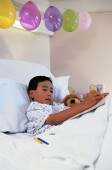
TUESDAY, Sept. 6 (HealthDay News) — Some children, especially those with rare conditions, receive many different drugs while in the hospital, a new study finds.
Acetaminophen, albuterol and antibiotics were the drugs most commonly given to hospitalized children, the researchers said. They also found an association between length of hospital stay and the number of drugs given to children.
On the first day in children’s hospitals, patients younger than 1 year at the 90th percentile of daily medication use received 11 drugs and those 1 year or older received 13 drugs. In general hospitals, patients younger than 1 year received 8 drugs and those 1 year or older received 12 drugs.
By the seventh day of hospitalization in children’s hospitals, patients younger than 1 year at the 90th percentile of total use of different medications had received 29 drugs and patients 1 year and older had received 35 drugs. In general hospitals, patients younger than 1 year had received 22 drugs and patients 1 year and older had received 28 drugs.
To arrive at the findings, researchers analyzed the medical records of 365,868 patients younger than 18, who accounted for 491,451 admissions in 52 children’s hospitals in 2006. In addition, they examined the medical records of 221,559 patients younger than 18, who accounted for 260,740 admissions in 411 general hospitals the same year.
The study is published online Sept. 5 in the journal Archives of Pediatrics & Adolescent Medicine.
Patients with rare conditions were more likely to receive a greater number of drugs, said Dr. Chris Feudtner, Children’s Hospital of Philadelphia, and colleagues in a journal news release.
The researchers noted that information on safety and efficacy in children is lacking for many drugs given to children in hospitals.
Funding for the study was provided by a grant from the U.S. Agency for Healthcare Research and Quality Center for Education and Research on Therapeutics.
More information
The U.S. Food and Drug Administration offers tips for giving nonprescription medicines to children.

